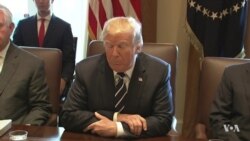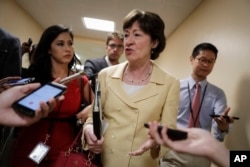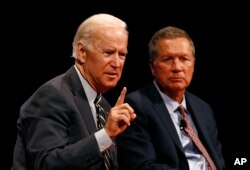During last year’s U.S. election campaign, then candidate Donald Trump vowed to be a disruptive force in Washington if he won the presidency. Trump has made good on that promise of late, but the country remains split on whether his actions help or harm the public good.
During a Cabinet meeting earlier this week, Trump touted his achievements so far, despite public approval ratings below 40 percent in most polls.
“We are getting tremendous accolades for what we are doing,” he said.
Some of the president’s recent moves proved to be controversial, including his decision to undo parts of former President Barack Obama’s health care law and declining to certify the Iran nuclear agreement to Congress.
WATCH: Trump Lives up to Pledge to be a Disrupter, but Country Divided Over Results
Disrupter in action
Some experts saw that as Trump simply following through on his pledge to be a political disrupter.
“President Trump was a pretty big rejection of the political establishment and he continues to be,” said Republican strategist John Feehery. “President Trump is not someone who is playing by the usual rules.”
Trump remains under pressure to continue that pattern by his former chief strategist, Steve Bannon, who is now trying to rally grassroots conservatives to oppose Senate and congressional candidates supported by the Republican establishment.
“This is not my war. This is our war,” Bannon told the Value Voters Summit last week in Washington. “And you all did not start it. The establishment started it.”
Trump also faces pressure from Republican moderates like Susan Collins of Maine to be more inclusive as he goes about carrying out his political agenda.
“We must stop allowing partisanship to be a pre-existing condition that prevents meaningful health reform,” Collins announced at the same time that she has decided to stay in the Senate, declining interest in running for governor of Maine.
Bipartisan pushback
Trump’s disruptive approach has also drawn plenty of critics, including some Republicans like Ohio Governor John Kasich, a rival of Trump’s in last year’s Republican presidential primaries.
Kasich appeared at a forum Tuesday at the University of Delaware with former vice president Joe Biden, who was sharply critical of Trump’s political style.
“We have a president who does not understand governance. Forget his policies for a minute. He doesn’t understand how the government functions,” Biden said.
The president’s habit of attacking critics including fellow Republicans like Senators Bob Corker and John McCain has become a major distraction, said George Washington University political expert Matthew Dallek.
“He spends a significant portion of his presidency thinking about how he is going to attack his critics, and then attacking them,” he said.
Back in the fold
Senate Republican leader Mitch McConnell knows about the president’s penchant for attack firsthand. Trump complained about McConnell on Twitter after Senate Republicans failed to pass a plan to repeal and replace Obamacare. But this week the two men said they were on the same page in terms of the president’s congressional agenda after a meeting at the White House.
“We are together totally on this agenda to move America forward,” McConnell said.
That agenda includes tax reform, a key test for the president and his Republican allies in Congress who face a midterm election next year.
“If they can get to yes on tax reform, then they will be in moderately good shape going into the midterm elections,” said Brookings Institution analyst Bill Galston. “If they don’t, I think they will have a very, very uninspiring story to tell their constituents and there are likely to be consequences for that.”
And yet, as much as tax reform looms as a centerpiece of the upcoming congressional agenda, Republicans have yet to agree on exactly what their tax plan will include and how it will fit into the broad outlines of tax reform recently announced by Trump.









